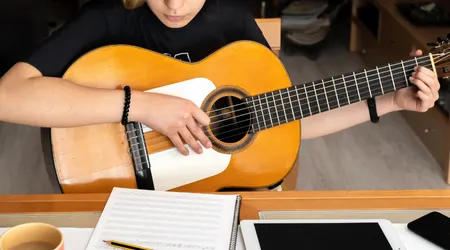How to Create an Effective Music Practice Schedule for Your Level

THE music study schedule is the compass that guides musicians of all levels towards progress.
Advertisements
Learning an instrument or improving vocal techniques requires dedication, but without organization, the effort can go to waste.
In 2025, with the multitude of digital resources and hybrid methods, creating an efficient plan is more accessible, but requires strategy.
This guide, designed for beginners, intermediates, and advanced players, offers a clear path to structuring your musical studies.
Let's dive into how to build a plan that respects your time, level, and goals, with practical tips and insights based on real-world practices. Why not turn your passion into concrete results?
Advertisements
Music, like any discipline, thrives on consistency. A 2019 study from the University of London revealed that 631% of amateur musicians abandon their instruments due to lack of organization.
One music study schedule A well-designed approach avoids this fate. It aligns practice, theory, and rest, maximizing learning.
Plus, with modern tools like metronome apps and online lesson platforms, customizing your schedule has never been so convenient.
This article details steps to create a tailored plan, with real-life examples and strategies that fit your lifestyle.
Understand Your Level and Set Clear Goals
Knowing where you are is the first step to figuring out where you want to go. Beginners, intermediates, and advanced learners have different needs. music study schedule.
A beginner guitarist, for example, focuses on basic chords, while an advanced pianist seeks to polish complex scales. Ask yourself: What is my goal?
Playing a specific song, mastering improvisation, or preparing for an exam? This clarity shapes your plan.
For beginners, small goals generate motivation. Learning three chords in a week is more realistic than attempting an entire song.
Intermediates must balance technique and creativity, such as practicing scales and improvising.
++ How to Set Up Your Home Studio on a Budget
Advanced artists, on the other hand, need specific challenges, such as exploring new genres or refining expressive nuances. Write your goals down in a notebook or app, like Notion, to keep them visible.
Also, consider your available time. A student with 30 minutes a day needs a compact plan, while a musician with two hours can include more exercises.
Also consider your learning style: do you prefer videos, sheet music, or in-person lessons? This introspection ensures that music study schedule be functional and enjoyable.

Structure Time Intelligently
Time is your greatest ally, but only if managed well. Divide your music study schedule in focused blocks: warm-up, technique, repertoire and theory.
For example, a saxophone beginner might set aside 10 minutes for breathing exercises, 15 for scales, and 10 for a simple song. This segmentation keeps the practice varied and avoids monotony.
See more: How to Set Up Your Home Studio on a Budget
Use the Pomodoro technique (25 minutes of focus, 5 minutes of rest) for short, productive sessions. For intermediate musicians, include harmony analysis or ear training.
Advanced learners can dedicate time to transcription or composition. The table below suggests a 1-hour daily breakdown, adaptable to the level:
| Level | Heating | Technique | Repertoire | Theory/Creativity |
|---|---|---|---|---|
| Beginner | 5 min | 15 min | 20 min | 10 min |
| Intermediary | 10 min | 20 min | 20 min | 10 min |
| Advanced | 10 min | 25 min | 15 min | 10 min |
Also consider the ideal time. Studies show that practicing in the morning increases retention. If your routine is nighttime, adjust without guilt, but maintain consistency.
Apps like Trello can help you visualize and adjust your plan on a weekly basis.
See also: How to Warm Up Your Fingers Before Playing: Essential Techniques for Musicians
Another crucial point is rest. Intense sessions without breaks lead to exhaustion.
Set aside a day a week to review without active practice, such as listening to recordings or watching masterclasses. This approach maintains music study schedule sustainable and prevents burnout.
Choose Current Tools and Resources
In 2025, technology is a powerful ally for the music study schedulePlatforms like Yousician offer interactive lessons for beginners, while apps like EarMaster refine the ear of intermediates.
For advanced users, tools like MuseScore allow you to create and analyze complex scores. Choose features that complement your level and style.
For beginners, YouTube videos, such as those on the "Cifra Club" channel, are accessible and practical. Intermediate
You can explore paid courses on platforms like Coursera, which offer music theory modules. Advanced musicians benefit from online masterclasses, such as those at Berklee College of Music.
Combine digital resources with traditional methods, such as technique books (e.g., Hanon for piano).
Additionally, record your practice sessions. A simple smartphone can capture progress and failures, allowing for adjustments. Use headphones with a built-in metronome, like those from Soundbrenner, to keep pace.
These tools make the music study schedule more dynamic and effective.
Adapt the Schedule to Your Progress
One music study schedule It's not static. Reevaluate your plan every two weeks to reflect progress or difficulties. For example, a beginner who has mastered chords might include fingerings.
Intermediate players who struggle with improvisation should set aside more time for ear training. Advanced players can adjust their focus to challenging genres, such as jazz or contemporary music.
Practical example: Ana, a beginner ukulele player, created a 30-minute daily schedule. After a month, she swapped repetitive exercises for simple pop songs, maintaining her motivation.
Another case is Pedro, an intermediate violinist, who added 10 minutes of vibrato after noticing stagnation. These adjustments keep the plan relevant.
Use a music journal to record what worked and what didn't. Jot down feelings, such as "the D major scale flowed better today."
This practice, common among professional musicians, helps personalize your schedule. After all, your plan should evolve with you.
Additionally, seek feedback. In-person or online lessons with instructors offer valuable insights. If that's not feasible, share recordings on forums like Reddit's r/musictheory.
Adjust the music study schedule based on external criticism accelerates progress.
Balance Discipline and Pleasure

Music is art, not just technique. One music study schedule Effectively blends discipline with moments of pleasure. Set aside 10% of your time to play something you love, even if it's outside your level.
For beginners, this might be a simplified version of "Bohemian Rhapsody." Intermediate players can improvise over a blues tune. Advanced players can experiment with genre fusions.
Think of the schedule as a sheet of music: there are mandatory notes, but also room for expression. Without pleasure, practice becomes a chore.
A 2021 statistic from the Royal College of Music shows that 78% of musicians motivated by passion persist longer than those focused solely on technique. Play for fun, not just to improve.
Celebrate small victories. Did you manage to play an entire song? Record it and share it with friends. These moments boost motivation.
Also, try new contexts, like playing in virtual jam sessions on Discord. This keeps the schedule alive and inspiring.
Finally, avoid comparisons. Your journey is unique. A beginner doesn't need to sound like a professional, just as a seed doesn't make a tree.
Focus on your progress, and the music study schedule it will be a tool for growth, not pressure.
Conclusion: Your Musical Journey Starts Now
Create a music study schedule It's like building a bridge between where you are and where you dream of being.
It organizes your practice, respects your level, and keeps your passion alive. In 2025, with digital resources and flexible methods, there's no excuse to postpone.
Start small, adjust often, and celebrate every step. The music awaits you—what will your next note be?
Whether you're a beginner strumming the first strings or an advanced player polishing a sonata, your schedule is your map. Use the tips in this guide, experiment with modern tools, and adapt the plan to your own pace.
Consistency, combined with pleasure, transforms effort into art. Play, learn, grow. The physical or virtual stage is yours.
Frequently Asked Questions
1. How long should I practice per day?
It depends on your level and availability. Beginners: 20-30 minutes; intermediate: 45-60 minutes; advanced: 1-2 hours. Consistency matters more than duration.
2. Can I create a schedule without a teacher?
Yes! Use apps, videos, and forums to guide you. A teacher accelerates progress, but isn't essential at first.
3. How to maintain motivation in the schedule?
Play music you love, celebrate achievements, and vary your workouts. Connecting with other musicians online also helps.
4. Do apps replace in-person classes?
Not entirely. Apps like Yousician are great for practice, but teachers offer personalized feedback, which is crucial for progress.
